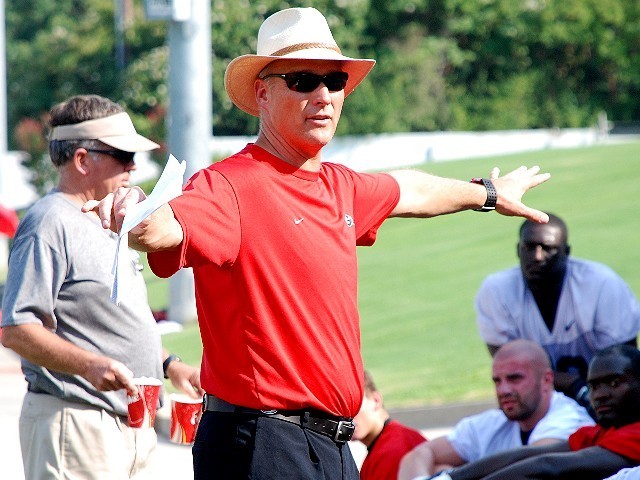That said, here's a mea culpa for something I wrote back in August. Going back and reading my season prediction for the Bulldogs today engendered a certain amount of embarrassment on my part -- I think the Latin term is mea stupida.
OK, maybe that's a bit harsh. But clearly, my trust in the ability of the Bulldogs program was misplaced when I predicted Georgia would win 10 games and reach the SEC championship in 2010.
This begs the question, what level of ability currently resides in Athens, and will things look up anytime soon from Georgia's current 6-6 record and impending Liberty Bowl bid?
I would like to believe so. I truly hope that Mark Richt can rediscover the ingredients that helped Georgia capture two Southeastern Conference championships and finish with 10 or more victories five out of six seasons between 2002-07. But after three straight campaigns of diminishing returns, it seems a long shot to believe the Bulldogs will return to the forefront of the SEC in the near future.
That's not to say that Richt has forgotten how to coach. The man did not fluke his way to that historic start in Athens. But the SEC is a very different place than it was even three years ago, and one wonders whether Richt will do what is necessary to push Georgia ahead of the win-at-all-costs regimes now in charge in Tuscaloosa and Gainesville -- let alone the talent in place in Baton Rouge, Columbia, Auburn and Fayetteville.
And it appears that talent is very much an issue in Athens.
Watching Georgia Tech's previously average offense knife through Georgia's defense like so much hot butter last Saturday drove home a point that has been needling some Bulldogs fans for the past few seasons: Where is the NFL-level talent?
Certainly, fans were getting impatient with new defensive coordinator Todd Grantham after watching the Yellow Jackets roll up 512 yards in Athens, but one wonders just what the first-year coordinator might have done better with a unit that currently features just three players with NFL futures -- and only one with first-day draft pick potential in Justin Houston.
The only member of the Georgia defense ready to make an impact at the next level certainly made his presence felt last weekend, as Houston came up with crucial sacks, returned a fumble for a touchdown and sealed the victory with an interception. But outside of the junior -- who has made similar plays all season and could well be headed out of town a year early for the draft -- where are the playmakers that highlighted Richt's early tenure with the Bulldogs?
Richt came to Georgia as an offensive mind, known for his high-octane attacks at Florida State, but make no mistake, his championship teams in Athens were built on the backs of defensive playmakers like David Pollack, Boss Bailey, Thomas Davis, Jonathan Sullivan, Odell Thurman, Sean Jones, Charles Johnson and Quentin Moses. Outside of Houston, Brandon Boykin and Akeem Dent there are currently few Dog defenders ready to shine at the SEC level, let alone in the professional ranks.
This dearth of talent is something that must be corrected immediately for Georgia to return to the pinnacle. And this may, in fact, be the biggest issue facing Georgia currently -- not coaching techniques or strength and conditioning (though these issues have been brought up at length by Richt detractors).
Georgia's coach has said on record that his staff is going after a "Dream Team" in recruiting this offseason, including some highly touted players like Carver, Columbus running back Isaiah Crowell. Whoever inks with the Bulldogs in February, that class better include some standout defensive playmakers, or any hopes of a championship will remain dreams for the Bulldogs.
Replenish the defense with the type of players Richt inherited in 2001, and we could well see a rebirth in Athens. Until that time, however, I'm taking a wait and see approach to the future of Georgia football -- after all, who wants to write the "boy was I wrong" column again?
-- Morgan Lee is sports editor for Access North Georgia

Mark Richt

Morgan Lee
http://accesswdun.com/article/2010/12/234159
